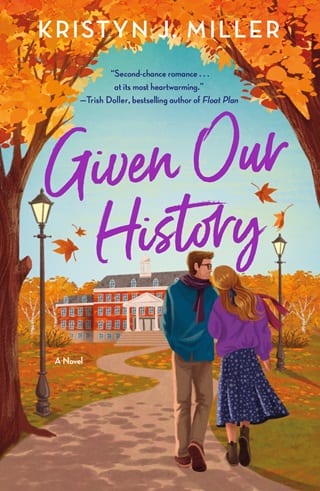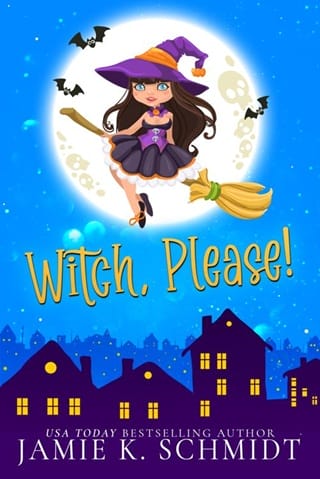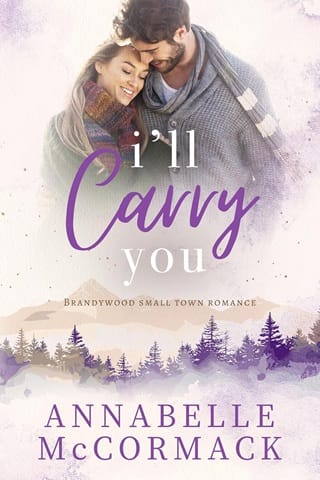Chapter 27
CHAPTER
27
NINE YEARS AGO
I moved to Manchester for my M.A. program, my old roommate found me on Facebook, and Teddy and I were close again. It started slow, a steady trickle of information, texts to check whether my plane landed safely and cell phone pictures of beautiful old buildings. Teddy had completed all his required coursework for his Ph.D., which meant he had moved from student to candidate, and while he was still exceptionally busy, he seemed a little less distracted—though I suspected his workload hadn’t lessened all that much, if at all. He still had a dissertation to write and he was working as an assistant to one of the professors, feeding Scantrons into a scanner to flesh out his resume.
For my part, I spent large swaths of my time playing around on WhatsApp, keeping in touch with my parents and exchanging fleeting updates with Izzy. She’d kept busy in recent years, jumping straight out of her bachelor’s into a volunteer program in Honduras, where she was being eaten alive by sand flies and posing for pictures with white-faced capuchin monkeys on Roatán. But I texted Teddy most often—not because I was expecting more than friendship, but because he was one of the few people in my life who’d been in my shoes. My family didn’t quite understand why I had to be so far away, why I needed to be in this master’s program as opposed to one closer to home; dispersed throughout the family group chat were prodding comments like It’s a shame you won’t be home for Thanksgiving and It must be lonely, living in a strange country all by yourself.
But it wasn’t lonely, not really. For one, England wasn’t all that strange—they spoke our language and I’d lived in London for an entire school year, so any semblance of culture shock was washed away with the first rain. My classes kept me busy, and my thesis busier. Several of the grads in my program arranged to meet for what they called History Happy Hour at a local pub, which I joined intermittently, but mostly I was focused on my work.
In October, Teddy called me. I thought it was strange because he almost always messaged me first to see if I had Wi-Fi—I wasn’t eager to rack up my phone bill. I was in one of the study areas in Rylands Library, just off the main hall, my textbooks spread across a single-person desk beneath a latticed window. “Hey. I’m in the library,” I whispered into the phone. But it was quiet. I pulled it away from my ear to make sure I’d answered the call. After a few seconds, I heard something—breathing, I thought—and my stomach sank. Something was wrong. “What is it? Is everything okay?”
“It’s my dad,” he said. “He had a stroke.”
“Oh my god, Teddy. I’m so sorry.” Immediately, I sprang into action, packing up my things so that I wouldn’t have to whisper.
“I don’t know what to do,” he was saying. “They need me. He can’t manage the business like this, he’s not the same now, Clara, it’s—” He broke off, breathing hard. “I don’t think he can go back to work.”
I slung the book bag over my shoulder and made my way out onto Deansgate. It was busy at that hour, the pavement shaded by brick-and-mortar buildings. “Don’t panic,” I said in what I hoped was a soothing voice. “The same sort of thing happened to my parents, and they ended up—”
“It’s not the same thing,” Teddy argued. “Your dad was able to get worker’s comp. You were still living at home, you helped take care of him. It’s completely different.”
I tried not to feel too irked by his immediate dismissal of my experience. I needed to be patient and empathetic. “You could sell off the business,” I suggested. “The auto body shop. It’s not like you’re going to run it.”
“He’d never forgive me.”
“If he can’t work—”
“You don’t get it,” Teddy interrupted. “Clara, I’m worried I’m going to have to drop out.”
I couldn’t fathom it. There was no way that Teddy—who’d been eager to start college early, remained laser-focused on his goals through his late teens and into his early twenties—would just walk away from everything he’d worked so hard to achieve. He resolved to finish out the semester before flying home for the holidays, but everything beyond that was up in the air. We talked on the phone almost every week, but he was often distracted, a little scattered, and I was content to just be a listening ear.
For my part, I decided not to fly home for the holidays after my parents told me they planned to take Reagan to visit Grandma for a few days. Nothing against my grandmother, but the thought of flying home only to drive eleven hours to Knoxville—or even flying directly into McGhee Tyson, and then spending a week sleeping on a forty-year-old mattress that smelled like mothballs—sounded miserable, so I politely declined.
Instead, I spent the week leading up to Christmas wandering Manchester, growing increasingly aimless. I didn’t regret staying put for the holidays, not exactly, but the weather was bleak and I was bored waiting for school to start up again, to give me purpose. For years now, I’d compartmentalized my life into a series of end goals: get into a good university; earn my bachelor’s; get into another good university; earn my master’s and my Ph.D. or DPhil so that I could get a tenure-track job and have all the emotional and financial security I’d dreamed of. I tried not to think about what goals I’d set after that, or how I’d function without a five-year plan.
On Christmas Eve, I wandered the Christmas market on Brazennose Street, where the spicy smell of gingerbread clung to the nippy air. I bought a cheap bottle of white wine at Lidl, fully intending to spend the evening drinking it alone, but then one of my classmates invited me to a dinner at her flat. A pity invite, I assumed, but with nothing better to do, I went. I sat with strangers around a long table with a red tablecloth and too much food. There was something a little surreal about it, like it was all staged—a movie set mimicking what a holiday dinner should have been, the guests paid actors, talking about meaningless things that sounded interesting on paper but that I couldn’t convince myself to care about.
Afterward, I walked back to the student housing by myself, feeling uncharacteristically listless. But I knew this feeling would pass; I only felt like this because it was my first Christmas alone. Even the streets were empty and cold. My breath fogged the air and the pavement was absent its usual foot traffic, no black hackney carriages pulling up to the curb.
All I had to keep me company was my phone, and it jingled in the pocket of my puffer jacket, alerting me to an incoming call: Teddy Harrison. I didn’t have Wi-Fi out on the street, which meant no WhatsApp, so a phone call would probably cost me an arm and a leg. But it was Christmas Eve, so why not? I slid to answer.
“Sorry,” Teddy said as soon as I answered. “What time is it there?”
I pulled my phone away from my ear to check the clock. “A little after ten. I’m just walking back from dinner.”
“By yourself?”
I didn’t miss the concerned tone. “It’s pretty safe,” I said. Actually, in retrospect, I’m not sure that it was safe, but I didn’t really think much of it at the time. Walking home alone, at night, in the cold had seemed like the perfect solution to shock me out of this strange and melancholy ache—not quite homesickness, but a hollowness, like a jigsaw puzzle with a piece missing.
“Anyway,” I said, “how’s everything across the pond?” I couldn’t imagine he was calling just to wish me a good Christmas Eve, not when a Christmas Day phone call had always been our tradition. Every time we’d talked lately, it had been because he needed a sounding board. And I was happy to be that right about now. Something to give me purpose.
“Fine,” he said. Then, taking a deep breath, he added: “I’m going to take a year off. Figure some things out.”
I nodded to myself, processing this. “What about the shop?”
“Dad had a couple guys working in there with him,” he said. “My mom figures we can rent the space out to them. There’s some legal stuff to figure out, and I’m not sure how exactly we’re going to budget, but—” He broke off. “Clara, this isn’t why I called.”
I’d reached the cathedral, and any other night, I might’ve marched on past. But tonight, I stopped to look at the Gothic clock tower, its knuckled spires all the more menacing in the dark. They’d erected a Christmas tree on the lawn, the wind-tattered boughs strung with lights that glowed a soft, buttery white. “Why’d you call, then?”
“I miss you.”
“I miss you, too,” I said, a little wary.
“I mean it when I say that, you know. I think about you every minute of every day.” His deep voice was hoarse, raw with some unnamed emotion. Maybe he’d been drinking, too. “I thought about flying out there to surprise you, to talk about everything in person, before I realized that was completely idiotic,” he said with a gruff laugh. “I don’t even know your address.”
My eyebrows pinched together. “What are you talking about?”
“I’m talking about us.”
Us. One word, and the whole conversation shifted, like the world’s axis was nudged slightly off-kilter.
“God, I’m butchering this,” he said with a humorless laugh. “It’s just that all this, Dad having the stroke, trying to juggle everything with my research, it’s a lot. And I’ve been thinking. You’re the one thing in the world that makes me happy right now, you’ve been there for me through all of it. I guess I don’t really understand why we’re still wasting time.”
I shook my head even though he couldn’t see me, feeling small in front of the colossal Christmas tree and looming cathedral. In some ways, I’d wanted there to be an us for a long time. But at the same time, transitioning from friends to something more felt like taking a leap across an ever-widening chasm, hoping we’d find our footing on the other side.
“We’re not wasting time,” I said. “We’re working toward things. Focusing on—”
“But what’s the point, if we could turn around and lose everything tomorrow?”
I tossed up a hand. “What’s the point in anything?”
“Sorry, I don’t think I’m—” he said, sighing, a rush of wind in my ear. “I’m not saying we both drop out. I’m saying that I don’t want to waste another day not being with you.”
His voice sounded tinny through the phone, small and faraway. There was something unsatisfactory about it, to not have him standing in front of me, looking me in the eye as he said all these things. Things I might’ve liked to hear, under different circumstances— later, I wanted to beg him. Tell me these things later. Because right now, all they did was hurt. “I have to finish school,” I whispered.
“Then finish it,” he said. “I’m not asking you to drop out. You’ve got six months left in Manchester, and then you can come back here, find—”
“I’m not talking about my master’s,” I interrupted. “I’ve applied to a doctoral program at Notre Dame. In Indiana,” I added, with emphasis, when he didn’t immediately say something.
“Then we try long distance,” he said, undeterred.
“That never works.”
“It could work with us.”
“It’s a distraction,” I blurted, throwing my free arm wide. “You’re only saying all of this now because you don’t have anything better to do.” It shut him up; the line went deathly quiet. “Shit.” I pressed my fingers into my forehead, hanging my head. “That didn’t come out right. All I meant is that you might feel differently once you’re back in school.”
“You’re not listening,” he said. “You matter more to me than school. More than some stupid plan, tenure by thirty, whatever else I thought I was going to—I mean, what the hell, I’m only studying history because you showed me how to fall in love with it.” My heart stuttered at the mention of love, even when he wasn’t directly confessing it. “You’re always there, Clara. In everything I do. You’ve always been it, for me. Tell me you don’t feel the same.”
What scared me most was the temptation to say yes. Frustrated tears had welled in my eyes, smudging all the lights on the Christmas tree, because I already knew what I had to say, and it was going to kill me to say it. Later wasn’t an answer. Later would only create a false sense of hope, warp our friendship into some sort of sadistic waiting game—though maybe it had always been that, in a way.
“No.”
“No, what?” he asked, annoyed.
I took a shaky breath. “No, I don’t feel the same.”
His voice cracked a little as he said, “You’re lying.”
I shut my eyes tight. It killed me, hearing him like that. But I had to stand my ground. “I’m telling you no.”
He fell silent, breathing hard. I just stood there, wiped my nose on the back of my sleeve, waiting for him to say something. The minutes seemed to stretch on, until finally, he managed a quiet, “Merry Christmas, Clara,” and the line went dead.
 Fullepub
Fullepub 



